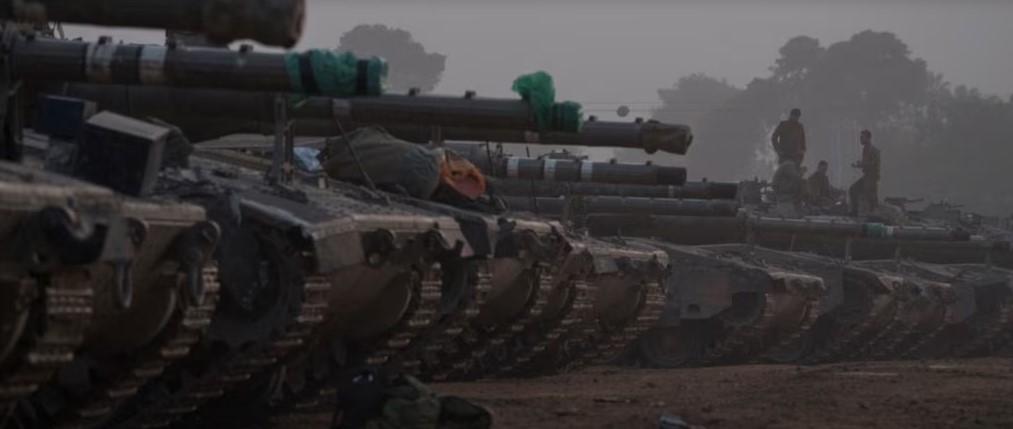Israel signaled a new phase in its offensive in the Gaza Strip by announcing Monday it will be reducing the number of its soldiers in Gaza while pursuing more targeted operations against Hamas in the enclave.
A statement by the Israel Defense Forces said the soldiers’ withdrawal is expected to “significantly alleviate economic burdens” and allow the troops “to gather strength for upcoming activities in the next year, as the fighting will persist, and their services will still be needed.”
Rear Admiral Daniel Hagari said the war is expected to continue. The objectives of the war “require prolonged fighting” he said Sunday.
Israel also pulled tanks out of some Gaza districts, according to residents there.
Defense Minister Yoav Gallant said at a news briefing Monday that some of the Israeli communities north of the Gaza Strip that were evacuated in the wake of the October 7 attack by Hamas will be able to return soon as military operations progress.
Meanwhile, the U.S. Navy announced that the USS Gerald R. Ford aircraft carrier was returning to its home port in Virginia after being deployed to the Eastern Mediterranean following the outbreak of hostilities.
Israel has been under pressure from the United States, its top ally, to shift to lower-intensity operations in Gaza and to protect Palestinian civilians.
Fighting rages on
Despite Israel’s shift in military operations, fighting rages on in the enclave. Hamas militants in Gaza fired a barrage of rockets Monday, prompting air raid sirens to sound across Israel.
There were no reports of damage or casualties from the rockets, which Hamas has continued to use to target Israel as Israeli forces carry out an offensive to eliminate Hamas in Gaza.
Israeli airstrikes were intensified. The Israel Defense Forces said a strike killed a Hamas commander who helped lead the fighters responsible for the October 7 terror attack in southern Israel.
The IDF identified the commander as Adel Mesmah, and said he also helped lead Hamas fighters against Israeli forces in Gaza after Israel launched its offensive.
The Israeli military said Monday that its troops and aircraft “struck a series of targets in Lebanon, including terrorist infrastructure, military sites in which Hezbollah terrorists were operating, and launch posts.”
Israel has warned that, if Hezbollah does not back down, a full-on Lebanon war looms. Both Hamas and Hezbollah are backed by Iran, whose militant allies in Syria, Iraq and Yemen have also been carrying out longer-range attacks against Israel.
U.S. forces Sunday sunk three Houthi boats in response to an attack by the Iran-backed militants on a Maersk container ship in the Red Sea.
U.S. Central Command said the Houthis fired on the Maersk Hangzhou and attempted to board it. U.S. Navy helicopters responding to a distress call from the Maersk Hangzhou also came under fire, and in return sank the Houthi boats while a fourth escaped the area.
The Houthis said 10 of their fighters were killed.
The Yemen-based group has targeted ships in the Red Sea in a show of support for Hamas, the Gaza-based militants who attacked Israel in October and prompted Israel to respond with an offensive aimed at eliminating Hamas.
The Israeli campaign to crush Hamas has left vast parts of the Gaza Strip in ruins. The Health Ministry in Hamas-ruled Gaza said the Israeli offensive has killed about 22,000 people. The ministry does not differentiate between militants and civilians but says 70% of those killed were women and children.
Israel began its military campaign vowing to crush Hamas after the October attack when Israel said about 1,200 people were killed and some 240 captives taken hostage, with 129 believed still held by Hamas in Gaza. The Israeli military says 174 of its military personnel have been killed so far in the fighting.
Hamas has been designated a terrorist organization by the United States, the United Kingdom, the European Union and others.
About 85% of Gaza’s 2.3 million people have been displaced, according to the United Nations. The U.N. has warned of the increased risk of hunger and disease, as desperate families shelter in makeshift tents against the winter cold.
The U.N. agency for Palestinian refugees said nearly 1.8 million people are sheltering in or in the vicinity of its overcrowded installations in Gaza. The agency has also reported damage from attacks hitting 128 of its sites, with 142 of its personnel killed.
VOA









Comment